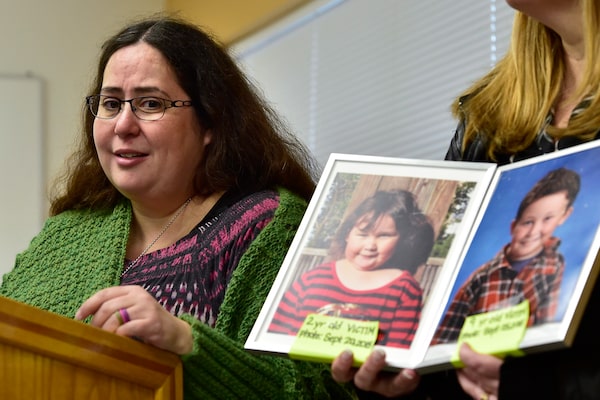
Jennifer Neville-Lake speaks to media as a supporter holds photos of her late daughter, Milly, left, and son Daniel, during a news conference following Marco Muzzo's parole hearing at the Beaver Creek Institution in Gravenhurst, Ont., on Nov. 7, 2018.Frank Gunn/The Canadian Press
A scion of billionaire developers who killed four people while driving drunk three years ago was denied parole on Wednesday, when a panel concluded he was hesitant to accept the seriousness of his alcohol problem.
Marco Muzzo is serving a 10-year prison sentence for causing a collision on Sept. 27, 2015, in Vaughan, north of Toronto, that ended the lives of three siblings, ages 9, 5 and 2, and their 65-year-old grandfather. He applied for release to a halfway house, on day parole, effective as early as this week, and full parole, beginning next May.
He seemed a good candidate for early release – a well-behaved inmate, with a supportive family and a job to go home to. Corrections authorities didn’t feel he had a serious enough drinking problem to allow him entry into one of their high-intensity substance-abuse programs. They said he was a low risk to reoffend and recommended he be granted parole.
And yet, after an emotional three-hour hearing, his application was rejected. Parole board member Kevin Corcoran, after questioning Mr. Muzzo at length about his alcohol use, said Mr. Muzzo seemed hesitant to acknowledge the extent of his impairment the day of the collision. He also had not told prison authorities about an incident in which police arrested him outside a strip club in 2012, when he, while in the police car in a drunken state, tried to kick out its windows.
“In our view, from the outset of your sentence, you sabotaged the progress you might have otherwise had by understating the seriousness of your problem,” Mr. Corcoran told Mr. Muzzo, in explaining why the two-person panel who heard his request turned him down for early release.
While Mr. Muzzo has the right to apply again after one year, the parole board is under no obligation to hear his case again before five years have passed, under changes to federal law brought in by the former Conservative government aimed at reducing the impact of frequent hearings on victims. By then, he would have been released at the two-thirds point, which is near automatic in federal prisons.
Mr. Muzzo has the right to appeal the decision to the parole board’s appeal division.
Jennifer Neville-Lake, whose three children, Daniel, Harry and Milly, and father, Gary Neville, died in the crash on Sept. 27, 2015, told reporters after the hearing that her life has been destroyed and the denial of parole doesn’t change that.
“There’s no win. It’s not a victory,” she said. “It doesn’t change a single thing for me, other than knowing that if it happens again, they have our case as a precedent.”
The hearing at Beaver Creek Institution in Gravenhurst, Ont., began with emotional testimony from the father, mother and aunt of the three children who died in the crash. Edward Lake said he suffers night terrors, breathing difficulties and no longer works because his job put him among children and families. “I miss being a dad,” he told Mr. Corcoran and a second board member, Christopher Sullivan.
His wife, Ms. Neville-Lake, said she is haunted by the dates at which their children will have been dead longer than they were alive. She said she has a “life sentence of misery and despair, as I sit by their graves to sing them lullabies.”
Mr. Muzzo, who was 29 at the time of the crash, returned that morning on a private airplane charter from his bachelor party. The Muzzo family, one of Canada’s wealthiest, owns the drywall company Marel Contractors and condo developer Pemberton Group, among others. Mr. Muzzo told the hearing that, although he had consumed three or four Caesars on the plane and more drinks throughout the previous evening, he chose not to call his fiancée or family for a ride nor hail a cab.
“I should have known better, but I took a chance,” said Mr. Muzzo, who sniffled and wiped away tears at times during his testimony. “I felt fine … there was that slight grogginess.”
Mr. Corcoran pressed him to square that description with what police and other witnesses had said: that his eyes were glossy and he had urinated himself. His blood alcohol level was between two-and-a-half and three times the legal limit. His Jeep Cherokee had been travelling at up to 120 kilometres an hour in an 80-km/h zone.
And he had run a stop sign, which he told the parole board members he hadn’t seen. “I believe my decision-making wasn’t there.”
“Was it impaired?” Mr. Corcoran asked. “You have a tough time saying that. You shouldn’t, at this point.”
Mr. Muzzo said he had done a “horrible thing. I shattered a family.” He said he has turned to prayer to deal with his feelings of shame.
 Sean Fine
Sean Fine